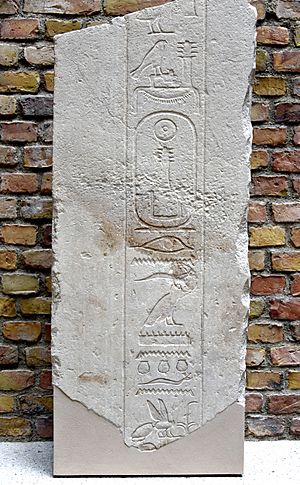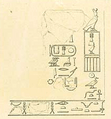Djedkare Isesi facts for kids
Quick facts for kids Djedkare Isesi |
|
|---|---|
| Djedkara, Izezi, Izzj, Asosi, Tankeris | |

Part of a door jamb showing the cartouche of Djedkare Isesi, Neues Museum, Berlin
|
|
| Pharaoh | |
| Reign | Duration uncertain, at least 33 years and possibly more than 44 years, in the late-25th to mid-24th century BC (Fifth Dynasty) |
| Predecessor | Menkauhor Kaiu |
| Successor | Unas |
| Consort | Setibhor |
| Children | Neserkauhor♂, Kekheretnebti♀, Meret-Isesi♀, Hedjetnebu♀, Nebtyemneferes♀ Uncertain: Raemka♂, Kaemtjenent♂, Isesi-ankh♂ Conjectural: Unas♂ |
| Burial | Pyramid of Djedkare Isesi |
Djedkare Isesi was an ancient pharaoh of Egypt. He was the eighth ruler of the Fifth Dynasty of Egypt. He ruled during the Old Kingdom. This was from the late 25th to mid-24th century BC.
Djedkare took over from Menkauhor Kaiu. He was then followed by Unas. Many historians believe Unas was Djedkare's son. This is because the change in rulers was very smooth.
Contents
Djedkare's Long Reign
Djedkare likely ruled for over 40 years. His time as pharaoh brought big changes to Egypt. Unlike earlier pharaohs, Djedkare did not build a temple for the sun god Ra. This might show that the god Osiris was becoming more important.
Djedkare also made major changes to how the Egyptian government worked. These were the first big reforms in the system of official titles. He also reorganized the funerary cults. These were for his ancestors buried in the necropolis of Abusir. He changed the rules for the priests who served these cults.
Trade and Expeditions
Djedkare sent many expeditions to other lands. He sent groups to Sinai to get copper and turquoise. He also sent them to Nubia for gold and a hard stone called diorite. Another famous trip was to the faraway Land of Punt to find incense.
One expedition included a special event. People used oracles to predict if the trip would be successful. This is one of the earliest records of such a practice. The word "Nub," meaning gold, was first used to describe Nubia during Djedkare's rule.
Under Djedkare, Egypt continued to trade with the Levant coast. They also carried out raids in Canaan. In one official's tomb, there is an early drawing of a battle or a city siege.
Djedkare's Burial and Legacy
Djedkare was buried in a pyramid in Saqqara. His pyramid was called Nefer Djedkare, which means "Djedkare is perfect." Today, the pyramid is mostly ruined. This is because people stole stones from its outer casing long ago.
When archaeologists explored the pyramid in the 1940s, they found Djedkare's mummy. Studies of the mummy showed that he died when he was in his fifties.
After Djedkare died, people continued to honor him. They had a special cult that lasted until the end of the Old Kingdom. During the Sixth Dynasty, pharaohs gave many gifts to his cult. Even much later, in the New Kingdom (around 1550–1077 BC), people still remembered him.
Djedkare is also known because of his Vizier Ptahhotep. Ptahhotep is believed to have written The Maxims of Ptahhotep. This is one of the oldest pieces of wise wisdom literature.
Images for kids
-
Alabaster vase bearing an inscription celebrating Djedkare's first "Sed" festival, Musée du Louvre
-
Two statues of Ptahhotep, a vizier during Djedkare's reign
-
Drawing by Karl Richard Lepsius of a relief of Djedkare, Wadi Maghara
-
The pyramid of Djedkare in Saqqara
See also
 In Spanish: Dyedkara Isesi para niños
In Spanish: Dyedkara Isesi para niños
 | Selma Burke |
 | Pauline Powell Burns |
 | Frederick J. Brown |
 | Robert Blackburn |











